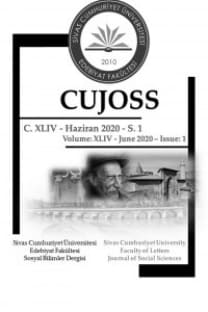Demokratik Meşruiyet Versus Karizmatik Meşruiyet
Siyaset ve sosyal bilimcilerin teorilerinin ve son seçimlerden (3 Kasım) sonra da Türk siyasal sisteminin ana konusu olan meşruiyet sorununu incelediğimiz bu çalışmada demokratik meşruiyet ve karizmatik meşruiyet (kahramanlık/karizma/liderlik) teorilerini karşılaştıracağız. Her iki teorinin de siyasal ve sosyal düşüncede ve Türk demokrasisindeki tarihsel, geleneksel ve felsefi kökenlerini irdeleyeceğiz. Bu çalışmada, daha detaylı olarak her iki meşruiyet tipolojisinin kendi siyasal iktidarlarını meşrulaştırmak için kullandığı temel değerleri/araçları da ayrıntılı olarak yorumlayacağız. Bu bağlamda, bireysel tercih ve toplumsal karar alma olgularını demokratik meşruiyetin; din, mitoloji, siyasal ve sosyal kültür, gelenek ve ideolojiyi de karizmatik meşruiyetin temel değerleri/araçları olarak inceleyeceğiz.
Democratic Legitimacy Versus Charismatic Legitimacy
This study analyzes the legitimacy theories that the main question that occupied political and social thinker and Turkish political system after the election. In this study, we will compare the theories of the democratic legitimacy and charismatic legitimacy (heroism, charisma, leadership). We will go on comparing further of these teories both by historical, traditional and philosophical roots in the political and social thought and Turkish democracy. In this study, in detail, examines and criticizes the means that these legitimacy typologies resorts to justify the political power: individual choices and social decision-making are conceived as the means of the democratic legitimacy; the religion, mythology, political and social culture, tradition and ideology are defined as the charismatic legitimacy means.
___
- AKAL, Cemal Bali. (1991), Yasa ve Kılıç, Afa Yayınları, İstanbul.
- APTER, D.A. (1965), The Politics of Modernization, Chicago: University of Chicago Press.
- ARDIGO, Achille. (1987), "The Moral Question and Legitimation", Current Sociology, V:5-2, Sum.
- BALL, Alan R. (1988), Modern Politics and Government, 4.Ed., Clatham New Jersey, Clatham House Publishers.
- BARKER, Ernest. (1962), The Social Contract, Oxford: Oxford U.P.
- CARLYLE Thomas. (1976), Kahramanlar, Çev: Behzat Tanç, Kutluğ Yayınları, İstanbul.
- CIPRIANI, Roberto. (1987), " The Sociology of Legitimation", Current Sociology, V:5-2, Sum.
- COHEN, Ronald. (1988), "Introduction", State Formation and Political Legitimacy, Edited by: Ronald COHEN-Judith D. TOLAND, Transaction Books, New Brunswick (USA)-Oxford (UK).
- DAHL, Robert, A. (1993), Demokrasi ve Eleştirileri, Çev: Levent Köker, Türk Siyasi İlimler Derneği ve Türk Demokrasi Vakfı Yayınları, Ankara.
- DAHL, Robert, A. (1961), Who Governs?, New Haven Connecticut: Yale University Press.
- FERRAROTTI, Franco. (1987), "Legitimation, Representation and Power", Current Sociology, V:5-2, Sum.
- HEGEL, G.W.F. (1991), Tarihte Akıl, Çev: Önay Sözer, Ara Yayınları,İstanbul.
- MACHIAVELLI, Niccole. (1994), Prens, Çev: Nazım Gönenç, Anahtar Kitaplar Yayınevi, İstanbul.
- PANTON- GILL, Geoffrey -Peter. (1988), Introduction to Politics, 2.Ed., Oxford: Basil Blackwell.
- PLATON. (1995), Devlet, Çev: Sebahattin Eyüboğlu-M. Ali Cimcoz, Remzi Kitabevi, İstanbul.
- ROUSSEAU, J. J. (1965), Toplum Sözleşmesi, Çev: Vedat Günyol, Çan Yayınları, İstanbul.
- SARTORİ, Giovanni. (1993), Demokrasi Teorisine Geri Dönüş, Çev: T. Karamustafaoğlu-M. Turhan, Türk Demokrasi Vakfı, Ankara.
- WEBER, Max. (1993), Sosyoloji Yazıları, Çev: Taha Parla, Hürriyet Vakfı Yayınları, İstanbul.
- ISSN: 1305-5143
- Yayın Aralığı: Yılda 2 Sayı
- Yayıncı: Sivas Cumhuriyet Üniversitesi Edebiyat Fakültesi
Sayıdaki Diğer Makaleler
Demokratik Meşruiyet Versus Karizmatik Meşruiyet
Ulaşım Hizmetlerinde Hizmet Kalitesi ve Bir Uygulama
İlköğretim Altıncı Sınıf Öğrencilerinin Matematik Dersinde Karşılaştıkları Sorunlar
Toplumsal Değişim ve Eğitim Üzerine
Toplumun Tabakalı ve Olasılıklı Yapısı
Merton's Starin Theory: Evidence from the High Schools in Ankara
